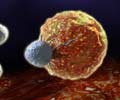Scientists have designed a mathematical model to predict the response of HIV-infected individuals to a type of cancer immunotherapy.

‘From the mathematical model, the scientists predict that most HIV-infected individuals will benefit from checkpoint inhibitor therapy, but the benefit is dependent on intrapatient immune responsiveness.’





Focusing studies on HIV and cancer patients is relevant because many long-term HIV patients develop cancer. HIV therapies have improved over the years and patients live longer, but they have an increased risk of cancer due to constant immune activation. T cells play a central role in both diseases due to their central role in the immune response. These types of lymphocytes can specifically recognize foreign antigens and respond to their presence. When the immune system is forced to be active for extended periods, such as with persistent viral infections or the progressive development of cancer, T cells receive an excessive amount of signals, which lead them to suffer gradual functional deterioration, a phenomenon known as T cell exhaustion.
Immunotherapy is a form of cancer treatment that uses the patient's immune system to recognize and fight the disease. There is a type of immunotherapy known as checkpoint inhibitors that are able to reactivate exhausted T cells, increasing their proliferation and function, thus reinvigorating the immune response against tumours. Most clinical trials with checkpoint inhibitors on cancer excluded patients with chronic infections, so data on this comorbidity is scarce. In this study, researchers generated models to assess how well HIV patients would respond to this therapy. Specifically, using both experimental and theoretical approaches, they aimed to quantify how the therapy with checkpoint inhibitors produces a T cell functional gain and also to predict the therapeutic effect for HIV patients at different stages of disease progression.
The scientists studied human blood samples from HIV-infected individuals, stimulated them with checkpoint inhibitors and then monitored the behaviour in cell culture. "Then we quantified the different responses, and developed a mathematical model to predict how the progression of HIV will be affected", said Gennady Bocharov. "We predicted how much the virus is reduced and how many CD4 T cells increase in the patient, which has a clinical significance", he added.
Advertisement
Their main prediction is that the individuals who already control HIV well do not benefit so much from this therapy, but individuals who do not control the virus well may benefit more.
Advertisement
Source-Eurekalert











